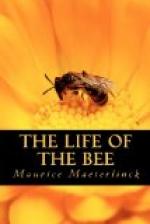[18]
Is it not strange that the hive, which we vaguely survey from the height of another world, should provide our first questioning glance with so sure and profound a reply? Must we not admire the manner in which the thought or the god that the bees obey is at once revealed by their edifices, wrought with such striking conviction, by their customs and laws, their political and economical organisation, their virtues, and even their cruelties? Nor is this god, though it be perhaps the only one to which man has as yet never offered serious worship, by any means the least reasonable or the least legitimate that we can conceive. The god of the bees is the future. When we, in our study of human history, endeavour to gauge the moral force or greatness of a people or race, we have but one standard of measurement—the dignity and permanence of their ideal, and the abnegation wherewith they pursue it. Have we often encountered an ideal more conformable to the desires of the universe, more widely manifest, more disinterested or sublime; have we often discovered an abnegation more complete and heroic?
[19]
Strange little republic, that, for all its logic and gravity, its matured conviction and prudence, still falls victim to so vast and precarious a dream! Who shall tell us, O little people that are so profoundly in earnest, that have fed on the warmth and the light and on nature’s purest, the soul of the flowers, wherein matter for once seems to smile, and put forth it? most wistful effort towards beauty and happiness,—who shall tell us what problems you have resolved, but we not yet, what certitudes you have acquired that we still have to conquer? And if you have truly resolved these problems, and acquired these certitudes, by the aid of some blind and primitive impulse and not through the intellect, then to what enigma, more insoluble still, are you not urging us on? Little city abounding in faith and mystery and hope, why do your myriad virgins consent to a task that no human slave has ever accepted? Another spring might be theirs, another summer, were they only a little less wasteful of strength, a little less self-forgetful in their ardour for toil; but at the magnificent moment when the flowers all cry to them, they seem to be stricken with the fatal ecstasy of work; and in less than five weeks they almost all perish, their wings broken, their bodies shrivelled and covered with wounds.




